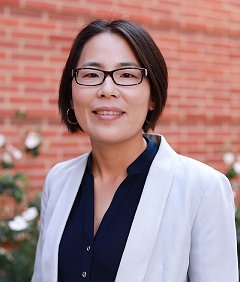Software Engineering for Big Data and Hardware Heterogeneity
Abstract: With the development of big data, machine learning, and AI, existing software engineering techniques must be re-imagined to provide the productivity gains that developers desire. Furthermore, specialized hardware accelerators like GPUs or FPGAs have become a prominent part of the current computing landscape. However, developing heterogeneous applications is limited to a small subset of programmers with specialized hardware knowledge. To improve productivity and performance for data-intensive software development, now is the time that the software engineering community should design new waves of refactoring, testing, and debugging tools for big data analytics and heterogeneous application development.
Bio: Miryung Kim is a Professor and a Vice Chair of Graduate Studies in UCLA Computer Science. She directs Software Engineering and Analysis Laboratory. She helped define the new area of Software Engineering for Data Intensive Computing (SE4DA and SE4ML). She works on automated testing and debugging for Apache Spark and developer tools for heterogeneous computing. She conducted the first systematic study of refactoring practices in industry and quantified rearchitecting benefits at Microsoft using Windows version history. She conducted the largest scale study of data scientists in industry. Her group’s Java bytecode debloating JDebloat made a tech transfer impact to Navy
Miryung Kim is a Professor and a Vice Chair of Graduate Studies in UCLA Computer Science. She directs Software Engineering and Analysis Laboratory. She helped define the new area of Software Engineering for Data Intensive Computing (SE4DA and SE4ML). She works on automated testing and debugging for Apache Spark and developer tools for heterogeneous computing. She conducted the first systematic study of refactoring practices in industry and quantified rearchitecting benefits at Microsoft using Windows version history. She conducted the largest scale study of data scientists in industry. Her group’s Java bytecode debloating JDebloat made a tech transfer impact to Navy.
She received her BS from KAIST and MS and PhD from University of Washington under the supervision of David Notkin. She was an Assistant Professor at the University of Texas at Austin, moved to UCLA as an Associate Professor with tenure in 2014, and was promoted to a Full Professor in 2019. She spent time as a visiting researcher at Microsoft Research. She is an Amazon Scholar at Amazon Web Services.
She produced 6 professors (Columbia, Purdue, two at Virginia Tech, etc). For her impact on nurturing the next generation of academics, she received the ACM SIGSOFT Influential Educator Award. She is a Program Co-Chair of ESEC/FSE 2022, one of top 2 conferences in SE. She is a Keynote Speaker at ASE 2019 and ISSTA 2022. She gave Distinguished Lectures at CMU, UIUC, UMN, UC Irvine, etc. She is an ACM Distinguished Member.
Fri 19 MayDisplayed time zone: Hobart change
11:00 - 12:30 | FOSE-Human & Tools, Ethics and QuantumFoSE - Future of Software Engineering at Meeting Room 110 Chair(s): Hourieh Khalajzadeh Deakin University, Australia | ||
11:00 10mTalk | Software Engineering for Big Data and Hardware Heterogeneity FoSE - Future of Software Engineering Miryung Kim University of California at Los Angeles, USA File Attached | ||
11:10 10mTalk | Got ethics? FoSE - Future of Software Engineering Tim Menzies North Carolina State University Pre-print | ||
11:20 10mTalk | The path to quantum at scale FoSE - Future of Software Engineering | ||
11:30 10mTalk | The Software Revolution of Obfuscation FoSE - Future of Software Engineering Myra Cohen Iowa State University | ||
11:40 50mPanel | Panel discussion FoSE - Future of Software Engineering | ||
